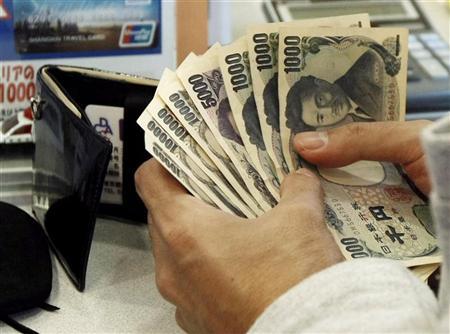
London: The yen weakened for a third day running on Thursday but was still close to a recent 18-month peak, with investors unconvinced by a signal from Japan's prime minister that it could step in to weaken the currency.
The yen, traditionally used a safe haven, has gained more than 15 percent against the dollar over the past six months, amid market turbulence and as investor expectations for a steady increase in U.S. interest rates have failed to materialise.
Prime Minister Shinzo Abe said on Wednesday that Japan was watching the yen's movements and would act if necessary, but market players generally believe the intervention bar is high. A U.S. Treasury report on Friday said "persistent one-sided" intervention by countries to weaken their currencies could see countries with big trade surpluses, such as Japan, classified as manipulators -- the latest sign that U.S. officials are not comfortable with more dollar gains. Having hit a 18-month low of 105.55 yen earlier in the week, the dollar edged up 0.1 percent to 107.14 on Thursday.
Japanese financial markets will reopen on Friday after shutting for the Golden Week holiday. In London, BNP Paribas currency strategist Sam Lynton-Brown said a recent announcement that Japan's government pension fund was hedging some of its dollar and euro exposure was significant.
"Ever since the start of Abenomics, Japanese investors have accumulated a large position in foreign assets but in large part haven't been currency-hedged because Abenomics was expected to weaken the yen," he said. "But if expectations of Abenomics being successful in weakening the yen dissipate, and that's what the theme has been in the last few months, then there is a large unhedged foreign asset position and in order to hedge that it means that institutional Japanese investors need to buy a lot of yen."
The possibility of currency intervention by Japanese authorities would be likely to rise if the dollar were to fall to 100 yen, said Tan Teck Leng, FX strategist for UBS Wealth Management in Singapore. In the past, Japanese officials had issued stronger verbal warnings on the yen's rise before intervening, Tan said, adding: "Ready to act and watching it closely is not yet the final warning."
The Australian dollar rose half a percent to $0.7499 , helped by upbeat Australian data, including a stronger-than-expected rise in retail sales in March.
The euro inched down 0.1 percent to $1.1474, helping the dollar index rise 0.1 percent and pull away from a 16-month low hit at the start of the week.